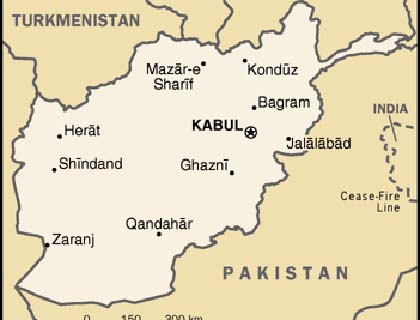The strategic geographical location of Afghanistan has made the country most vulnerable state in terms of hosting the great game of politics among the super and atomic powers like, America, China Russia, India, Pakistan and Iran. It is almost for four decades that the region has been the ground of political games.
There has been no conference, seminar and talk during the last decades in which the issues of Afghanistan have not been talked over – the issues which have got no concern with Afghanistan and have been politically imposed on Afghan society, the issues that have gifted the society nothing rather than unbeatable miseries.
Afghanistan is a land-locked region. It borders with China, Pakistan, Turkmanistan, Uzbakistan, Iran and Tajikistan. Additionally, Afghanistan is adjacent to Middle Eastern countries that are rich in oil and natural gas. It borders both Iran and Turkmenistan, countries with the second and third largest natural gas reserves in the world. Showing sympathy with Afghanistan does not mean that the super powers care about Afghanistan. In fact, they care about their own interests by having control over this state means closely monitoring the natural gas and oil.
Rivalry for pipeline routes and energy resources reflects competition for power and control in the region. Pipelines are important today in the same way that railway building was important in the 19th century. They connect trading partners and influence the regional balance of power. Afghanistan is a strategic piece of real estate in the geopolitical struggle for power and dominance in the region.
Afghanistan is not rich enough for its oil and gas. But it plays a vital rule in efficiently connecting the regions. This is why the people and country have been victimized in the region. Everyone tries to give a hand with Afghanistan in order to use this country as a tool for achieving their targets
The concept behind showing sympathy with Afghanistan and stabilizing the region is nothing more than fake promises made on political grounds. In fact, it is Afghanistan which lines up the opportunities for the super-powers to face each other easily and cast efficiently. The issues of Afghanistan extensively got on political screens since 1979, when the Soviet's red army invaded the region, but referring back to its collated historical background with neighboring countries such as Pakistan. Afghanistan had long been the focal point of American government.
During 1940s, the Soviet Union was being considered as the sole power among the Asian countries and the US government was looking to find a solution of having a sharp eye on Soviet Union's activities in the region. Finally, by the formation of Pakistan during 1947s, the way for America's government to monitor the Soviet Union got paved.
Pakistan, during its initial years had the options of building political commitments with Soviet Union or United States of America. During 1950 -1953: In order to build further diplomatic ties, the first prime minister of Pakistan, Liaqat Ali Khan traveled to United States to meet President Harry S Truman. During the visit to US, the PM Khan faced an unexpected request by the President of USA. President Truman, in reward to endorse military supports and maintain a peaceful diplomatic relations between the two the countries requested Pakistan to allow CIA to establish a base in Pakistan so as to keep sharp eyes on the activities of Soviet Union in the region. The Prime Minister did not accept the request at that time, but Pakistan had no better alternative rather than USA for remaining on the screen in the region.
Throughout the era of 1950 – 1953, many high ranking officials of Pakistan visited USA to straighten diplomatic relations and military supports strategies between the two countries. Finally, in 1954 Pakistan and United States of America signed the Mutual Defense Assistance Agreement which lined the opportunity for many Pakistani soldiers to be trained in United States.
Moreover, the agreement paved the way for US to establish a Military Assistance Advisory Group in Rawalpindi. Furthermore, Peshawar Air Station was evacuated for American Army to monitor the Soviet Union activities in the region.
Soviet Union's invasion in the region did not last more than ten years. The last Soviet army left the country in 1989. But the game did not end there, even it got more complicated. Soon after soviet devastation, Mujahidin, the Islamic fighters, took over the country's administrations. Mujahidin created different political parties and began a new chapter of the civil war fighting for the power in the region.
The victory of 1989 was forgotten and the so called Islamic fighters did not hesitate to use any war strategy for owing the sole power in the country that finally greened the ground for a third party emergence under the leadership of Mullah Mohammad Omar. Taliban's regime was welcomed in some parts of the country but was not fully supported and appreciated by most of the ethnics.
Taliban along imposing the fundamentalist Islamic laws in an extremism manner, turned the country to a save heaven for international terrorist by tying a close link with Al-Qaeda network. Finally, as a result of World Trade Center collision in Sept, 11, 2001 which was blamed on Al-Qaeda based in Afghanistan; the regime was removed off the scene by the officially invasion of US-led army in Afghanistan.
The US-led army since mid 2001, by sacrificing around 1974 of its army man and spending billions of dollar assured the long term presence of America. The long term Strategic Partnership Agreement which was signed in May, 01, 2012 spells out the future commitment of American government with Afghanistan and nominating Afghanistan as the Non-NATO ally of USA warns the opponents to be alert in case of any interference. Simultaneously, the neighboring countries in order to keep America busy within Afghanistan will not feel sorry to use any political strategy for continuing the drama of great game by using Afghanistan as the stage of the scenes.

